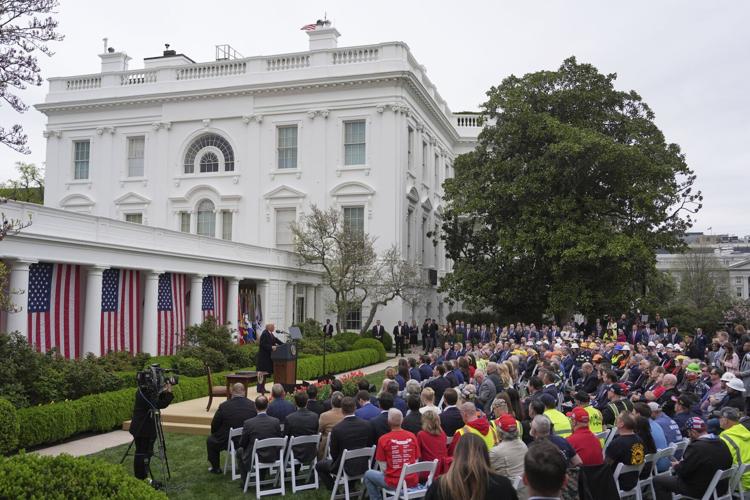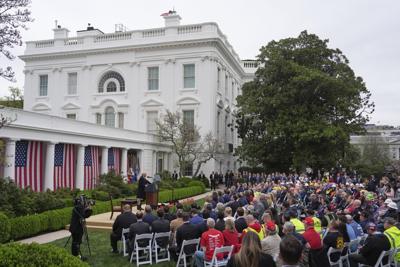Bricks keep flying through the window.
One day, it’s . Next, delayed tariffs. Then — duck again — it’s the stock market, nukes in Iran, airstrikes in Yemen, deportations to El Salvador, bond market jitters and more court rulings. And throughout, there’s the passing parade of coaches being fired, pronouns being misused, Elon Musk cutting something and new revelations about the White Lotus cast.
What we need is perspective, which is the best means to sort through times of commotion. Let’s start by looking at which issues matter most to our fellow Americans. Maybe that will help.
Of all the issues that voters are personally worried about, inflation is number one, according to the new Harvard CAPS-Harris poll. That’s no surprise; inflation always hits home and was probably the main reason Donald Trump was elected president in 2024. A sizable 41% of voters now pick inflation as their top issue, with both parties closely in accord: 40% of Democrats and 43% of Republicans agree. Other polls show similar attitudes.
Following inflation, the next issue of personal importance to U.S. voters is something called “American values of merit and competence.” This touches both social and economic affairs. While 12% of the country ranks this on top, 16% of Republicans and 10% of Democrats do.

Ron Faucheux
Immigration follows at 10%. But this is much more a Republican issue (17%) than a Democratic one (4%).
Crime ranks fourth at 8%, with little difference based on party affiliation. Crime may be getting scant attention these days as a national issue outside of immigration controversies, but it remains a serious public concern that could easily catapult into higher numbers based on events.
Trade policy and climate change are tied at 7%. More Democrats than Republicans pick trade policy — and a whopping six times more Democrats than Republicans pick climate change as the most important issue.
Racial equity and abortion also tie, each at 5%. More Democrats than Republicans pick both abortion and racial equity as their top issues.
Bringing up the rear is curbing guns (chosen by 4% of independents, 3% of Democrats and 2% of Republicans) and foreign affairs (picked by 1% of independents, 1% of Democrats and 3% of Republicans). In this troubled world, it’s amazing how low foreign affairs rate.
Politically, what do these numbers mean?
While they generally indicate public angst and even confusion, the big risk for Trump and congressional Republicans is the majority of voters that equate higher tariffs with more inflation. A recent Economist/YouGov survey finds that 78% of all voters believe increased tariffs will raise prices. Even 66% of Trump voters agree.
Here’s another red flag for Republicans: A solid 55% of independents, who often decide close elections, said in the prior Economist/YouGov poll that the president’s tariffs will hurt the U.S. economy and only 23% said they will help it. Moreover, majorities of Whites, Blacks and Hispanics agreed that tariffs will hurt both the economy and their own financial well-being.
While Republican strategists worry about the inflation-tariff linkage, they’re hopeful Trump’s policies will be in place and working well by next year’s congressional elections. They can point to the latest CBS �ƹϴ�ý poll to bolster their case: 65% of voters say new tariffs will make the U.S. economy worse in the short term, but only 42% say the same about the long term. These strategists believe time is on their side.
CBS polling also shows that 85% of Republican voters believe Trump’s tariffs will add manufacturing jobs to the U.S. — a major reason why they continue to support the president's trade policies. Additionally, nearly half say it will take a year or longer to judge the impact of these policies.
Democratic strategists, on the other hand, see economic conditions as Trump’s Achilles' heel, and expect the blowback to help them recapture control of the U.S. House in 2026. The Republican House majority is thin, and a shift of a small number of seats could make the difference. Democrats will have a tougher time flipping the Senate.
Despite deep polarization, many Americans have mixed feelings about Trump. The CBS poll finds that 51% of voters like his goals, but 63% dislike his approach.
There you have it. Perspective.



